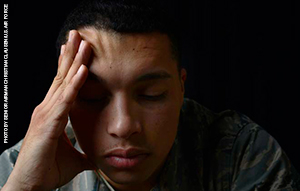 The VA Medicinal Cannabis Research Act was introduced in the Senate (S. 326) and House of Representatives (H.R. 1003) to mandate that the Department of Veterans Affairs study how cannabis reduces or increases the use of addictive and potentially deadly opiates, benzodiazepines and other medications. In addition to pain and post-traumatic stress disorder, the legislation would require the VA to examine how the plant affects sleep, agitation, mortality and hospital readmissions.
The VA Medicinal Cannabis Research Act was introduced in the Senate (S. 326) and House of Representatives (H.R. 1003) to mandate that the Department of Veterans Affairs study how cannabis reduces or increases the use of addictive and potentially deadly opiates, benzodiazepines and other medications. In addition to pain and post-traumatic stress disorder, the legislation would require the VA to examine how the plant affects sleep, agitation, mortality and hospital readmissions.
The Senate bill, and four other veterans bills, was voted unanimously out of the Senate Veterans’ Affairs Committee early this year, only to fall short of the required 60 votes to begin debate on the chamber floor. DAV members and supporters were alerted through DAV CAN (Commander’s Action Network) and asked to immediately contact senators who voted no to advancing the legislative package.
In addition to cannabis research, the Elizabeth Dole Veterans Programs Improvement Act, which carries the same number as the previous bill, includes provisions to improve outreach to veterans, expand long-term care options, increase support for caregivers and extend additional home loans to Native American veterans.
“Our nation’s veterans deserve options when it comes to treating the wounds of war, which is why VA needs to have a better understanding of how medicinal cannabis plays a role in their healing,” said Sen. Jon Tester of Montana, chairman of the Senate Veterans’ Affairs Committee. “Our bipartisan bill ensures VA is listening to the growing number of veterans who find critical relief from alternative treatments like medicinal cannabis while working to empower veterans in making safe and informed decisions about their health.”
Sen. Dan Sullivan of Alaska, a Marine veteran and original co-sponsor of the legislation, added that those who serve in the military “suffer from unseen wounds of war as a result of their sacrifices on behalf of our country.”
“Medicinal cannabis is already in use by thousands of veterans across the country, but we don’t yet have the data we need to understand the potential benefits and side effects associated with this alternative therapy,” said Sullivan.
Established research has shown that veterans are at higher risk of PTSD than the general population and experience barriers to care when seeking adequate mental health treatment.
“This [bill] will allow us to explore treatments for chronic pain and other ailments that our veterans face, without the need for opiates,” said Rep. Jack Bergman of Michigan, a retired Marine lieutenant general, who introduced the legislation in the House along with Rep. Lou Correa of California.
Thirty-nine states and the District of Columbia now allow medical marijuana, with wide variations in how those programs regulate the production, distribution and use of medical cannabis. However, since marijuana remains a Schedule I controlled substance, veterans risk running afoul of federal laws even in states that have legalized cannabis for medical and recreational use.
Under current VA policy, veterans are encouraged to discuss their marijuana use with clinicians. However, VA doctors are prohibited from recommending or prescribing cannabis, and veterans who possess it on VA grounds are breaking federal law.
“This nation has a duty to turn over every stone in the hopes of finding new and alternative therapies for our veterans,” said DAV National Legislative Director Joy Ilem. “We appreciate the bipartisanship on this issue and look forward to this legislation advancing so this crucial study can get underway.”






